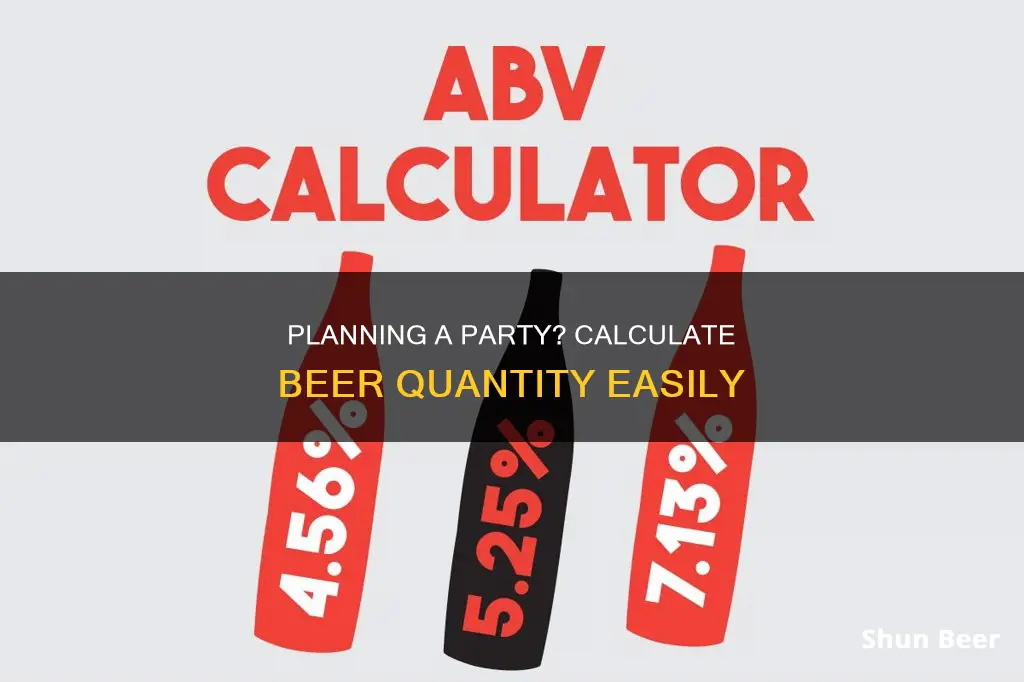
Planning an event or party can be fun, but it's also time-consuming. One of the trickiest parts is figuring out how much alcohol to buy, especially when it comes to beer. There's no perfect answer, but using a beer calculator can make your life a lot easier. These calculators take into account factors such as the number of guests, the duration of the event, and the type of beer you want to serve. They can help you estimate the total number of drinks needed and how many bottles of beer to buy. It's always better to have more than enough rather than run out, and you can also use these calculators to plan for wine and liquor servings. So, whether you're hosting a wedding reception or a simple house party, a beer calculator can help you ensure your guests have a great time.
| Characteristics | Values |
|---|---|
| Purpose | To calculate the amount of beer, wine, and liquor needed for an event |
| Input | Number of guests, duration of the event, and the number of guests drinking beer, wine, or liquor |
| Output | Total number of drinks needed, and the number of bottles of beer, wine, and liquor required |
| Assumptions | Equal distribution of drink types; if beer and wine are selected, the calculator assigns an equal number of drinks to beer and wine |
| Additional Information | Time of the event, ratio of wine types, types of beer, ice, and liquor can also be included |
What You'll Learn

Beer, wine, liquor: how much of each?
Planning an event or party can be fun, but it's also time-consuming. One of the most challenging aspects is determining how much alcohol to buy, especially when it comes to finding the right balance of beer, wine, and liquor. While there is no perfect answer, there are some strategies and calculations that can help you make an informed decision.
First, it's important to consider the number of guests and the duration of the event. As a general rule, you should plan to serve two drinks per person for each of the first two hours and one drink per person for each subsequent hour. This calculation assumes an equal distribution of drink types. If you know the preferences of your guests, you can adjust this ratio accordingly.
For beer, a good rule of thumb is to assume that each beer drinker will consume one beer per hour. So, if you have 20 guests who drink beer and your event lasts for 5 hours, you would need a total of 100 beers.
Calculating the amount of wine needed can be a bit more complex. Typically, one standard 750ml wine bottle contains five servings, and it is customary to divide the number of wine drinkers by 2.15 and then by two to find the total number of bottles needed. So, if you have 30 wine drinkers, you would need approximately 7 bottles of wine.
When it comes to liquor, focus on drinks with an alcohol content of around 30% or higher. For these beverages, you can usually estimate 0.5 liters per person. So, for 10 liquor drinkers, you would need a total of 5 liters of liquor.
It's always a good idea to err on the side of caution and have more than enough rather than too little. These calculations provide a general guideline, but the actual consumption may vary depending on various factors. Remember to include non-alcoholic options and always encourage responsible drinking and designated drivers or alternative transportation methods.
Best Places to Buy Redbridge Beer
You may want to see also

Number of guests
The number of guests you're expecting is one of the most important factors in determining how much beer to buy. It's a simple calculation if you know exactly how many of your guests will be drinking beer, but if you don't, you'll need to make an estimate.
If you know the number of beer drinkers, the calculation is easy: the general rule is that one person drinks one beer per hour of a party. So, if you're throwing a 4-hour party and inviting 20 friends, 5 of whom you know will be drinking beer, you'll need 5 beers per person, which equals 25 beers in total.
However, if you're not sure who will be drinking beer, you'll need to make an estimate. In this case, it's a good idea to assume that beer will make up 40% of all the beverages you'll serve. So, if you're expecting 20 guests at your 4-hour party, you'll first need to calculate the total number of drinks: 20 guests multiplied by 4 hours equals 80 drinks. Then, you can work out the number of beers: 80 drinks multiplied by 40% equals 32 beers.
It's worth noting that these calculations assume an equal distribution of drink types. If you know your guests prefer beer, you may want to allocate a higher percentage to beer and lower percentages to wine and liquor.
Remember, it's always better to have too much than too little. You can always save any unopened beers for your next party or return them to the store.
The Best Places to Buy Chinese Beer
You may want to see also

Duration of the party
The duration of your party is a key factor in determining how much beer you should buy. As a general rule, you should expect your guests to consume one beer per hour. So, if you're planning a four-hour party with 20 guests who will be drinking beer, you'll need a total of 80 beers.
It's important to consider the drinking habits of your guests. If you know that your guests tend to drink more or less than one beer per hour, you can adjust your calculations accordingly. For example, if you're hosting a five-hour party and know your guests tend to drink two beers per hour, you'll need 100 beers for 20 guests.
The type of event you're hosting can also impact the duration of drinking. For instance, at a wedding reception, guests may drink more slowly and steadily over a longer period, whereas at a lively house party, drinking might be more intense but for a shorter duration. So, consider the nature of your event and whether your guests are likely to pace themselves or drink more rapidly.
Additionally, the availability of other beverage options can influence beer consumption. If you're only serving beer, your guests are likely to drink more of it. However, if you offer a variety of alcoholic and non-alcoholic choices, the overall beer consumption may decrease. Therefore, it's worth considering the full range of drinks you plan to provide when estimating your beer requirements.
In conclusion, when planning how much beer to buy, carefully consider the expected duration of the party, the drinking habits of your guests, the nature of the event, and the variety of drinks on offer. By taking these factors into account, you can make a more accurate estimation and ensure your guests are well-supplied without excessive waste.
Sheetz Gift Card Beer Purchase: Is It Allowed?
You may want to see also

Beer drinkers
Planning an event can be fun but figuring out how much beer to buy can be a tricky part of the process. The amount of beer you need depends on the number of guests and the duration of the event. As a rule of thumb, you should plan to serve 2 drinks per person for each of the first 2 hours and 1 drink per person for each hour after that.
If you know the number of beer drinkers at your event, you can use the following formula to calculate the total number of beers needed:
Number of beers = Number of beer drinkers X Party duration in hours
For example, if you are expecting 20 beer drinkers and your event will last 5 hours, you would need a total of 100 beers.
It is always a good idea to err on the side of caution and have more than enough rather than too little. You can also consider taking a poll or asking your guests ahead of time to get a better idea of their preferences.
Keep in mind that these calculations are estimates and actual consumption may vary depending on individual drinking habits and other factors.
Down Syndrome and Beer: Legal Drinking Age?
You may want to see also

Soft drinks
When planning a party, it's important to ensure you have enough drinks for your guests. The amount of soft drinks you need will depend on several factors.
Firstly, consider the number of guests and the duration of your party. As a general rule, for non-alcoholic beverages, assume that guests will drink two servings in the first hour and one for each additional hour. So, for a party lasting two hours, each guest is likely to drink three servings of non-alcoholic drinks.
Secondly, the weather can play a role. If the weather is warm, expect your guests to drink more. Similarly, if your party is taking place at night, your guests are likely to drink more than if it were in the afternoon.
Thirdly, consider whether your guests will be eating. If dinner is served, wine consumption may be higher, and guests may drink less overall.
- For a 2-hour party with 6 guests, you will need approximately 18 servings of soft drinks (6 guests x 3 servings per guest).
- For a 3-hour party with 12 guests, you will need approximately 36 servings of soft drinks (12 guests x 3 servings per guest).
- For a 4-hour party with 25 guests, you will need approximately 100 servings of soft drinks (25 guests x 4 servings per guest).
Remember, it's always better to have a little extra, and you can always ask your retailer if you can return unopened bottles or cans. Most unopened soft drinks will keep long after the party, so you don't have to worry about waste.
Buying Beer for a Minor: What's the Legal Risk?
You may want to see also
Frequently asked questions
It is generally recommended to plan for 2-3 drinks per person for the first hour of a party and 1-2 drinks per person for each hour after that. If you know the number of guests who will be drinking beer and the duration of the party, you can calculate the total number of beers needed by multiplying the number of beer drinkers by the duration of the party in hours.
To use a beer calculator, input the number of beer drinkers and the expected duration of the party in hours. The calculator will then provide an estimate of the total number of beers needed, rounded up to the nearest whole number. Some calculators also allow you to specify the type of beer, such as craft beer or traditional brews.
When using a beer calculator, it is important to consider the duration of the party and the drinking preferences of your guests. If you are unsure about who prefers beer, you can take a poll or estimate based on the total number of guests. It is generally better to err on the side of caution and have more drinks available than too few.







